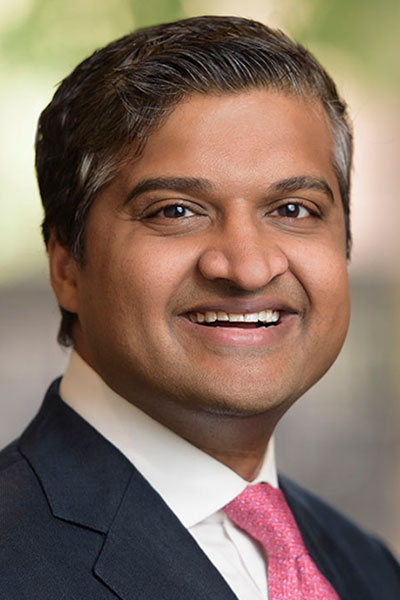This year’s basic science workshop at SABCS® will delve into organoids, single-cell sequencing, real-world genomics, and drug engineering and discovery.

“The focus of this workshop is to highlight four really exciting directions for analysis of breast cancer, using different types of cell models to link the data we get in in the laboratory with patient genetic data,” said the workshop moderator, Neil Vasan, MD, PhD. Dr. Vasan is a physician-scientist in the Department of Medicine and the Herbert Irving Comprehensive Cancer Center at Columbia University Irving Medical Center, where his lab investigates how kinases regulate breast cancer signaling, growth, and therapeutic response.
The workshop, Materials and Methods: Basic Science to Breast Oncology Workshop, will be from 2:05–3:05 p.m. CT, Tuesday, December 5 in the Stars at Night Ballroom 3-4.
Calvin J. Kuo, MD, PhD, the Maureen Lyles D’Ambogio Professor of Medicine-Hematology at Stanford University, will discuss organoids.
“In the laboratory, we grow cells on plastic in two dimensions, but since they grow as three dimensions in the body, organoids are a way to perform 3D cell growth in media conditions that more closely mimic physiologic conditions in the body,” Dr. Vasan explained. “In addition, we can see how these cancer cells interact with non-cancer cells, which is a very important topic for analysis in breast cancer.”
An additional presentation on single-cell sequencing will be announced soon. The topic is particularly relevant in breast cancer science.
“We know that not all cells in a tumor behave the same way or respond to therapy in the same way, so there is tremendous heterogeneity. One way to understand that heterogeneity is to investigate the expression of genes in different cells with RNA sequencing,” Dr. Vasan said.
Pedram Razavi, MD, PhD, a breast oncologist at Memorial Sloan Kettering Cancer Center, will further the discussion on breast cancer genomics.
“Real-world genomics is a timely discussion right now, because we have two different targeted therapies in breast cancer that are FDA approved, alpelisib and elacestrant,” Dr. Vasan said. He further explained, “The prognostic significance of different mutations is being studied in many phase I, early-stage clinical trials, to determine if a particular DNA change in a tumor might be exquisitely susceptible or even resistant to different classes of drugs.”
John Irwin, PhD, Adjunct Professor of Pharmaceutical Chemistry at the University of California, San Francisco, will provide an overview of new drug classes that may be relevant for breast cancer.
“In the last talk, we progress to thinking broadly about new ways to engineer and discover drugs,” Dr. Vasan said. “In the basic science field, there’s been a tremendous improvement in structural techniques, and many in our audience will have heard of AlphaFold, which is an AI protein-folding software that is greatly advancing the field.”
Dr. Vasan encourages all SABCS® participants to attend the workshop.
“Our audience in San Antonio will be a mix of basic scientists, clinical investigators, translational scientists, full-time clinicians, and industry representatives,” he said. “While some of the techniques being discussed in this session are very ‘high concept,’ there will definitely be relevant information for each of these audience members, which will soon relate to clinical decision making.”

